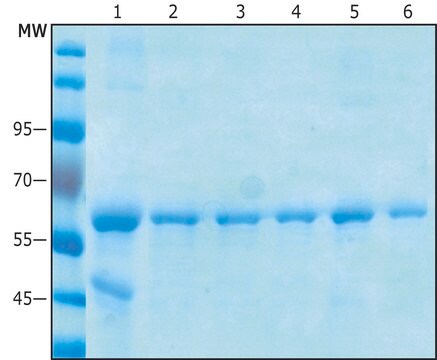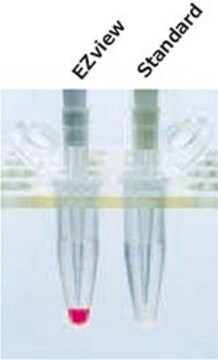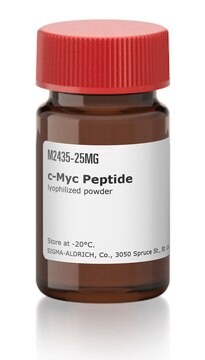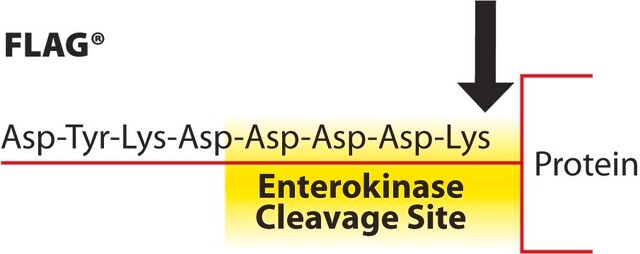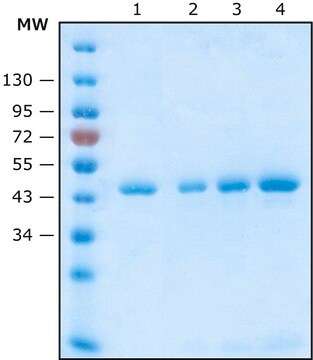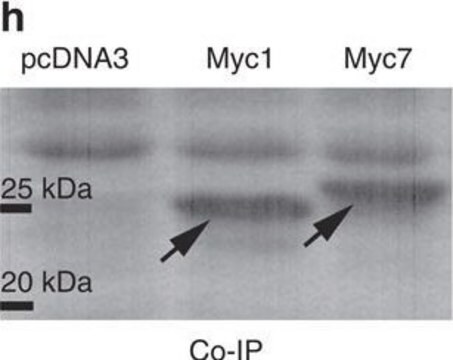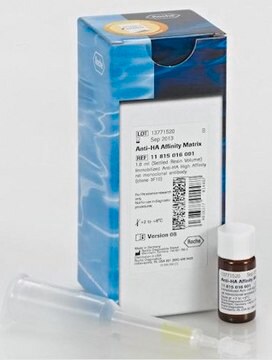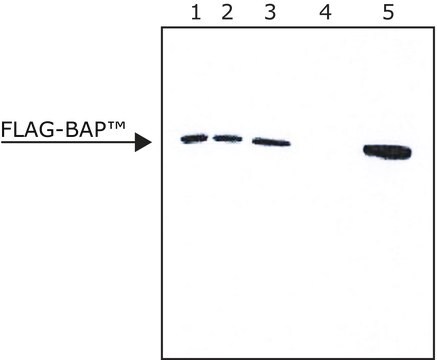E6654
EZview™ Red Anti-c-Myc Affinity Gel
Sinonimo/i:
Anti-c-Myc affinity resin, Anti-c-Myc agarose beads
Autenticatiper visualizzare i prezzi riservati alla tua organizzazione & contrattuali
About This Item
Codice UNSPSC:
12352203
NACRES:
NA.56
Prodotti consigliati
Durata
1 yr at 2‑8 °C
Classi chimiche degli analiti
proteins (c-Myc)
tecniche
affinity chromatography: suitable
immunoprecipitation (IP): suitable
Capacità
~0.05 mg/mL binding capacity
Temperatura di conservazione
2-8°C
Descrizione generale
EZ view Red Anti--c-Myc Affinity Gel is a resin that consists of the Anti-c-Myc rabbit antibody, covalently bonded to 4% Agarose beads. The affinity gel is used to bind c-Myc fusion proteins to samples, such as cell lysates and tissue, for purification of c-Myc-tagged proteins in preparation of immunoprecipitation assays. Red dye enhances visability for more efficient results.
Agarose beads bind at N-terminal, Met-N-terminal and C-terminal c-Myc fusion proteins from E. coli and mammalian cells.
Agarose beads bind at N-terminal, Met-N-terminal and C-terminal c-Myc fusion proteins from E. coli and mammalian cells.
Applicazioni
EZview® Red Anti-c-Myc Affinity Gel is suitable for:
- SUMOylation assay
- Affinity capture (immunoprecipitation) of N- or C-terminal c-Myc-tagged fusion proteins from E. coli or mammalian cells.
When performing small-scale affinity capture, such as immunoprecipitation, the affinity matrix is difficult to see in the microcentrifuge tubes. Accidental aspiration of the resin leads to quantitative variability in results. The EZview™ Red Affinity Gels greatly reduce the risk of pellet loss. EZview resins perform as well as conventional non-colored affinity gels, but allow the user to easily differentiate pellet from supernatant. This correlates to more accurate data because less protein is lost.
Caratteristiche e vantaggi
- Increased visibility - Red color reduces risk of incidental aspiration
- Improved recovery of target protein by reduced accidental loss
- Higher reproducibility - More consistent yields
Altre note
The affinity gel contains affinity purified anti-c-Myc rabbit polyclonal antibody covalently attached to beaded agarose. The c-Myc tag corresponds to amino acid residues 410-419 (EQKLISEEDL) of the human c-Myc protein.
Stato fisico
1:1 (v/v) suspension in PBS containing 50% glycerol and 0.0015% Kathon CG/IPCII as an antimicrobial preservative
Note legali
EZview is a trademark of Sigma-Aldrich Co. LLC
SabreLite is a registered trademark of Pelican Products, Inc.
Codice della classe di stoccaggio
10 - Combustible liquids
Classe di pericolosità dell'acqua (WGK)
WGK 3
Punto d’infiammabilità (°F)
Not applicable
Punto d’infiammabilità (°C)
Not applicable
Certificati d'analisi (COA)
Cerca il Certificati d'analisi (COA) digitando il numero di lotto/batch corrispondente. I numeri di lotto o di batch sono stampati sull'etichetta dei prodotti dopo la parola ‘Lotto’ o ‘Batch’.
Possiedi già questo prodotto?
I documenti relativi ai prodotti acquistati recentemente sono disponibili nell’Archivio dei documenti.
I clienti hanno visto anche
Suikang Wang et al.
The Plant cell, 31(2), 486-501 (2019-01-25)
PROTEIN PHOSPHATASE4 (PP4) is a highly conserved Ser/Thr protein phosphatase found in yeast, plants, and animals. The composition and functions of PP4 in plants are poorly understood. Here, we uncovered the complexity of PP4 composition and function in Arabidopsis (Arabidopsis
Haibo Du et al.
Neural plasticity, 2018, 2062346-2062346 (2018-05-26)
PDZD7 is an important deafness gene, whose mutations are associated with syndromic and nonsyndromic hearing loss. PDZD7 contains multiple PDZ domains that are essential for organizing various proteins into protein complex. Several PDZD7-binding proteins have been identified, including usherin, ADGRV1
Keiko Sato et al.
Microbiology (Reading, England), 155(Pt 4), 1282-1293 (2009-04-01)
The periodontopathic bacterium Porphyromonas gingivalis forms pigmented colonies when incubated on blood agar plates as a result of accumulation of mu-oxo haem dimer on the cell surface. Gingipain-adhesin complexes are responsible for production of mu-oxo haem dimer from haemoglobin. Non-pigmented
Yawen Liu et al.
EMBO reports, 19(10) (2018-08-22)
Cryptochromes are photolyase-like photoreceptors. Arabidopsis CRY2 (cryptochrome 2) primarily mediates the photoperiodic regulation of floral initiation. CRY2 has been shown to promote FT (FLOWERING LOCUS T) mRNA expression in response to blue light by suppressing the degradation of the CO
Kobi Simpson-Lavy et al.
Molecular cell, 68(6), 1120-1133 (2017-12-19)
The ability to respond to available nutrients is critical for all living cells. The AMP-activated protein kinase (SNF1 in yeast) is a central regulator of metabolism that is activated when energy is depleted. We found that SNF1 activity in the
Il team dei nostri ricercatori vanta grande esperienza in tutte le aree della ricerca quali Life Science, scienza dei materiali, sintesi chimica, cromatografia, discipline analitiche, ecc..
Contatta l'Assistenza Tecnica.

